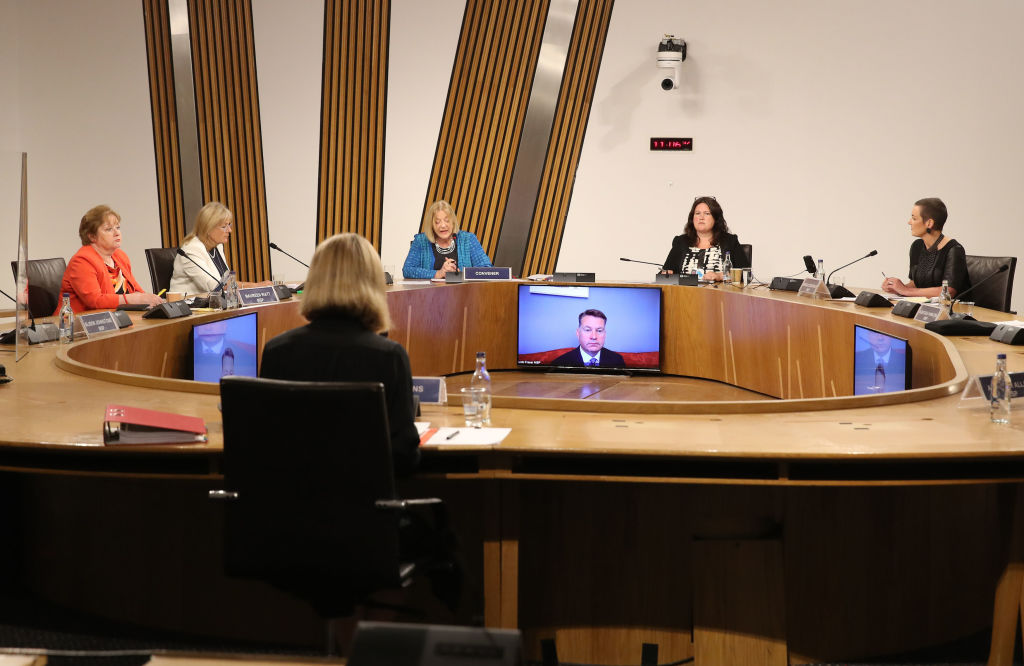The fallout from David Davis’s intervention in the Alex Salmond affair is all about the messages. The texts which the veteran Tory says he was given by a ‘whistleblower’ contain disturbing conversations between senior SNP and Scottish Government staffers. They raise questions about party involvement in a government investigation, the alleged ‘interference’ of Nicola Sturgeon’s chief of staff, and what the First Minister knew and when. The motivations behind these exchanges will be picked over by those convinced Salmond was the victim of a conspiracy, those convinced the Scottish Government fouled up but had good intentions, and a small smattering of Scots patiently waiting for the Holyrood inquiry to put all these matters to rest. Bless.
The messages are important in themselves but they raise broader questions about the ethical conduct of government in Scotland, separation of powers, the role of the Civil Service and the place and purpose of the Scottish Parliament. For one, it is evident — though it was long before now — that the Holyrood inquiry is not fit for purpose and was never meant to be. Its remit is too narrow, its power to hold the executive to account too feeble and several of its members demonstrably unsuited to rigorous interrogation. James Hamilton QC’s inquiry into whether Nicola Sturgeon broke the ministerial code, although headed by a distinguished lawyer, suffers from similarly straitjacketed terms.
The Spectator has previously called for the committee to be replaced by a judge-led public inquiry, as have I. Such an inquiry would be in the gift of Scottish Ministers, unless the next parliament can be convinced to compel them to hold one. Without it, we will likely never establish the truth about what happened, who did it, and why. Somewhere Westminster can act is in regard to the Civil Service. Scottish Government Civil Servants are nominally part of the UK Civil Service, but there have been fears for some time about the blurring of lines between government and party political business. Revelations from the Salmond inquiry – of deleted texts and emails, of testimony given under oath and then ‘revised’, of taxpayers’ money spent ‘preparing’ witnesses – hint at more prevalent and perhaps systemic problems.
Downing Street should commission an independent review into the role of the Civil Service in this matter and whether the institution’s standards have been compromised. It is essential that any such review not be conducted in-house at Whitehall, since it would be Whitehall’s conduct under review too. It is Whitehall which allowed these trends to fester and the impact of its disinterest, if not indulgence, must be scrutinised.
David Davis suggests amending the Scotland Act to draw a clearer separation between executive and prosecutorial powers, as well as granting MSPs the same extent of parliamentary privilege as MPs. These are not bad ideas, as such, but they are a water pistol brought to a dumpster fire. Devolution is, per the Prime Minister, a ‘disaster’ but the solution always seems to be more disaster. It is a constitutional sunk cost fallacy in which the political integrity of the UK pays the price. If the Scotland Act is to be revisited and the changes favoured by Davis made, it should be as part of a comprehensive reform of devolution that recalibrates the balance of powers between Holyrood and Westminster, reasserts the Union, and overhauls the flawed and flaccid Scottish Parliament. To tinker with devolution would be derelict. This disaster needs a large-scale clean-up operation — and fast.







Comments